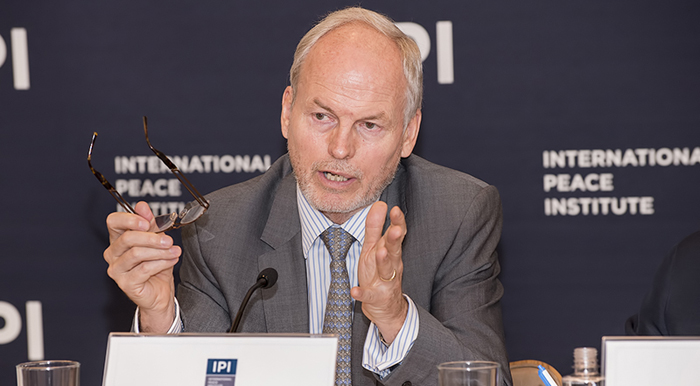
“This is a UN presence on the ground, out front in Somalia in a way that it hasn’t been in a generation,” said Nicholas Kay, Special Representative of the Secretary-General (SRSG) for Somalia, at an IPI event on September 13th, about the UN Assistance Mission in Somalia (UNSOM). The mission replaced the long-standing UN Political Office in Somalia (UNPOS) in June 2013.
UNSOM, located in Mogadishu, and the African Union Mission in Somalia (AMISOM) have worked in a coordinated manner and will take steps to implement a structurally integrated mission by January 1, 2014, working on Somalia’s peace and reconciliation process through peacebuidling and statebuilding, particularly “on state, security and rule of law institution building,” said Mr. Kay.
“The building blocks are there to engender some optimism,” said Mr. Kay. Despite these gains, however, Somalia still faces significant challenges, and will need more international assistance to keep moving forward.
Somalia has not had a federal government since 1991, when Siad Barre’s regime, the Supreme Revolutionary Council, was forced out and the nation began civil war. Since that time, Mogadishu has been struck by fighting and instability, and the UN mission was based in Nairobi until only last year.
In September, Somalia marked the first year anniversary of the new government led by President Hassan Sheikh Mohamud, marking the end of the transitional period. Through dialogue with other regions, the Federal Government of Somalia (FGS) has begun a constructive engagement on the issue of federalism. On August 28, 2013, the FGS and the Jubba administration signed an agreement establishing the terms of governance in three southern regions. The agreement was signed in Addis Ababa under the active mediation of the Ethiopian Foreign Minister as the Chair of the Council of Ministers for the seven-nation Intergovernmental Authority on Development (IGAD).
Security remains an “immediate concern” in Mogadishu and the south, and threatens to undermine the progress made. In recent months the militant Islamist group al-Shabaab has increased its attacks in Mogadishu carrying out assassination attempts on government officials, including President Mohamud. Concerns over security have led to a reduction in the international community presence on the ground, with organizations such as Doctors Without Borders (MSF) completely withdrawing from the country. Combating al-Shabaab will require a commitment from the international community to bolster the logistical infrastructure of AMISOM and the Somali National Forces.
Additionally, sexual violence and rape continue to be a pervasive issue in Somalia. In response to recent allegations of sexual crimes, AMISOM has embarked on awareness campaigns within the mission and the country at-large, and emphasized its zero-tolerance policy and its commitment to fighting impunity on sexual crimes.
At the IPI event, Mahamet Salah Annadif, Special Representative of the Chairperson of the African Union Commission (SRCC) for Somalia, outlined the composition of the Somali National Forces, including the Somali Police Force and several countries from the region contributing troops. “We also have a civilian component,” he said, “which supports the military work with some projects so as to make sure we win the hearts and minds of our brothers in Somalia.”
Instability and security challenges, however, are further complicated by the possibility of funding cuts to Somalia. “For Somali National Forces it’s only a matter of being paid,” Mr. Annadif said. International banks have been tightening rules to comply with international regulations against money laundering and the funding of groups accused of terrorism. Barclays is threatening to close all accounts with money transfer systems on September 30, cutting a $500 million (380 million euro) yearly flow. This proposed move could have disastrous consequences affecting the recovery progress of Somalia.
Regardless of the many challenges ahead, both speakers were hopeful. “We can be optimistic,” said Mr. Annadif. “Since I’m been there, I’ve noticed that there’s been a change in the mentality there, and the political class in Somali. No one wants war to restart. There’s a consensus that no wants to go backwards.”
A day before the discussion, Mr. Kay reported to the Security Council that he was “resoundingly optimistic,” he told the IPI audience. “And that’s a statement I stand by,” he added.
Watch event:







